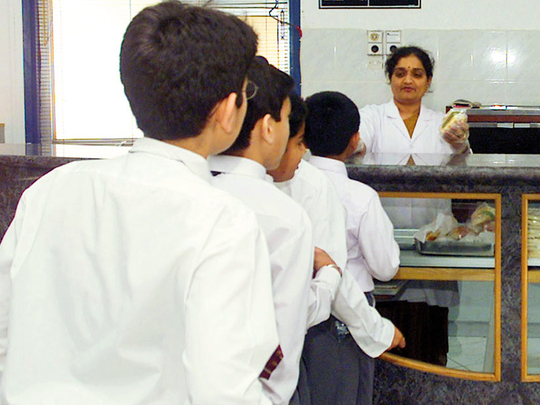
Dubai: Dubai schools may operate canteens during Ramadan if they ensure that food is not consumed in public, Gulf News has learnt.
It has been the practice in most schools in Dubai to close their canteens during Ramadan as a mark of respect to the students and teachers who fast.
The issue has assumed importance as Ramadan has started coming during academic year since last year.
Dubai authorities are increasingly supporting food businesses to offer their services to those who do not fast. For example, food courts in malls remain open after separating dining areas. The Knowledge and Human Development Authority (KHDA) has confirmed to Gulf News that it has never issued any directives to schools to close canteens in Ramadan.
The authority usually sends out “an advice note to assist schools to support Muslim students and staff in the holy month of worship”.
In this year’s note, a copy of which was shared with Gulf News, KHDA points out that Ramadan is understandably challenging for young Muslim students as they seek to carry out their daily routines while fasting.
One of the reminders for the schools about the collective responsibility to adhere to during Ramadan says: “Out of respect for the holy month of Ramadan and also for fasting students, staff and parents, eating and drinking must be prohibited in the public areas of each school. It should be limited to private, designated areas during this time.”
However, schools in Dubai keep canteens closed during Ramadan. For example, the practice has been in force at The Indian High School Dubai for several decades, said Ashok Kumar, CEO of the school. “To respect the sentiments of students who are fasting, we have been closing the canteens [on all campuses].
“We also tell the students not to eat in front of other students who are fasting. They are separated in classrooms while they eat,” he said.
Rashmi Nandkeolyar, principal of Delhi Private School, Dubai, said the school has also been traditionally closing its canteen during Ramadan.
“We do it with respect to the Muslim children and teachers in our school. Children who bring food and drinks are advised to use discretion.”
Kumar said it was not clear to schools that there is a provision to keep the canteens open to cater to non-Muslim students and even those Muslim students who are not fasting.
“[No ban on opening school canteen] is great news. We will try to open it next year.”
However, he added that care will be taken to ensure that canteens follow strict regulations so that students who are fasting are not exposed to the supply and dining of food by others.
Nandkeolyar said the tradition helps children to get used to the general trend that they need to be discrete about others fasting and the culture of not eating publicly.
While most parents support the idea of inculcating the values of tolerance, patience and respect for different cultures, some feel opening the canteen would be practically helpful for many children.
Shoma Goswami, who has two school-going children, is one of them.
In her daughter’s school, she said, the students who do not fast are allowed to sit inside the classroom and have food.
“But in my son’s school, they have non-fasting students eat food in the corridor as fasting students are more in number and they sit in the classroom during recess. If they open the canteen, they can at least sit and eat from there. It should not be in a way that disturbs the students who are fasting.”












